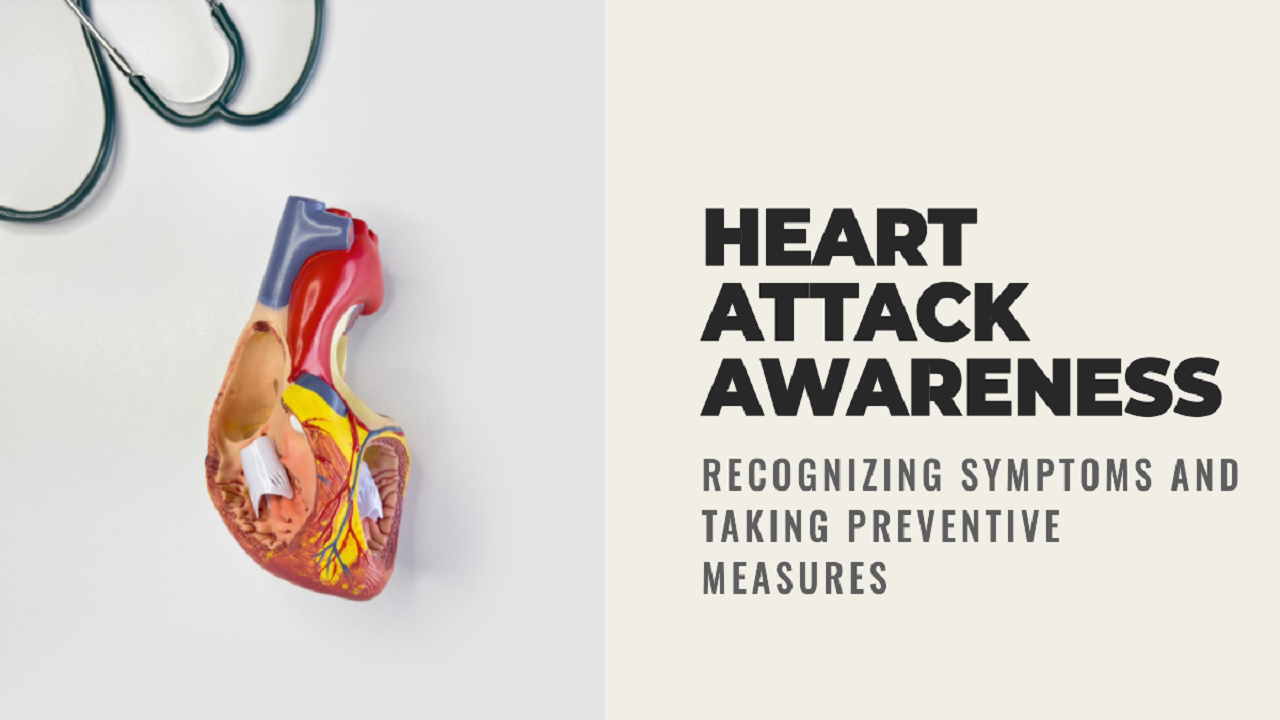Heart Attack Awareness: Recognizing Symptoms and Taking Preventive Measures
Increase your awareness of heart attacks by recognizing their symptoms and taking immediate preventive measures. Learn about the common warning signs such as chest pain, shortness of breath, fatigue, and more. Discover the actions to take during a heart attack and the importance of chewing aspirin. Additionally, explore preventive measures like maintaining a healthy diet, regular exercise, stress management, avoiding tobacco and limiting alcohol, controlling blood pressure and cholesterol, and scheduling regular check-ups with your healthcare provider. Together, these steps can help you safeguard your heart health and lead a healthier, happier life.

Heart attacks are a serious medical emergency and a leading cause of death worldwide. However, by increasing awareness and understanding of heart attack symptoms, individuals can take timely preventive measures and potentially save lives. In this blog, we will explore the importance of heart attack awareness, discuss the common symptoms to look out for and provide actionable preventive measures for a healthier heart.
Understanding Heart Attacks
A heart attack, also known as a myocardial infarction, occurs when the blood supply to the heart muscle is blocked, typically due to a clot in the coronary arteries. This blockage restricts oxygen and nutrients from reaching the heart, leading to damage or death of the heart muscle tissue.
Recognizing Heart Attack Symptoms
Recognizing the symptoms of a heart attack is crucial for prompt medical intervention. While chest pain or discomfort is the most common symptom, there are other warning signs to be aware of:
- Chest pain or discomfort: A feeling of pressure, tightness, or squeezing in the chest that may radiate to the arms, jaw, or back.
- Shortness of breath: Difficulty breathing or a feeling of breathlessness even during rest or minimal physical exertion.
- Nausea and vomiting: Persistent or unexplained nausea, vomiting, or indigestion-like symptoms.
- Fatigue: Unusual or extreme tiredness that persists, even with adequate rest.
- Sweating: Cold sweats, clammy skin, or perspiration that is not attributed to external factors.
- Lightheadedness or dizziness: Feeling dizzy, faint, or experiencing a loss of balance.
Immediate Actions to Take
If you suspect a heart attack, it is essential to act quickly. Here are the steps to follow:
- Call emergency services: Dial your local emergency number or seek immediate medical attention.
- Chew aspirin: If you are not allergic to aspirin, chewing a regular aspirin tablet (325 mg) can help reduce blood clot formation.
- Stay calm and rest: Find a comfortable position and avoid exertion to minimize strain on the heart.
- Don't drive yourself: It's safer to let emergency medical services transport you to the hospital.
Preventive Measures for a Healthy Heart
Preventing heart attacks involves adopting a heart-healthy lifestyle and managing risk factors. Here are a few precautionary steps to take into account:
- Maintain a healthy diet: Maintain a well-rounded eating plan that includes an abundance of fruits, vegetables, whole grains, lean sources of protein, and low-fat dairy products. Take care to moderate your intake of saturated and trans fats, sodium, and added sugars to promote a healthy diet.
- Engage in regular physical activity: Aim for at least 150 minutes of moderate-intensity aerobic exercise or 75 minutes of vigorous activity per week. Incorporate activities that strengthen your heart and muscles.
- Avoid tobacco and limit alcohol: Smoking damages blood vessels and significantly increases the risk of heart disease. Limit alcohol consumption to moderate levels or avoid it altogether.
- Manage stress levels: Find healthy ways to cope with stress, such as exercise, meditation, deep breathing, or engaging in hobbies.
- Control blood pressure and cholesterol: Regularly keep track of your blood pressure and cholesterol levels for effective monitoring. If necessary, take prescribed medications and make necessary lifestyle modifications to keep them under control.
- Maintain a healthy weight: Attain and sustain a healthy weight by combining a nourishing diet with consistent physical activity.
- Regular check-ups: Schedule routine check-ups with your healthcare provider to assess your heart health, review risk factors, and make necessary adjustments to your preventive measures.
Conclusion
Heart attack awareness plays a pivotal role in saving lives. By recognizing the symptoms and taking immediate action, individuals can seek appropriate medical help promptly. Additionally, adopting preventive measures and making lifestyle modifications can significantly reduce the risk of heart attacks. Remember, a proactive approach to heart health is the key to a long and healthy life.









